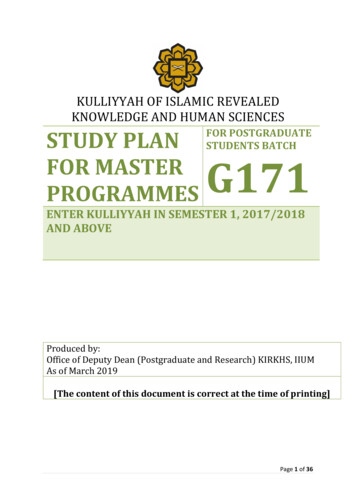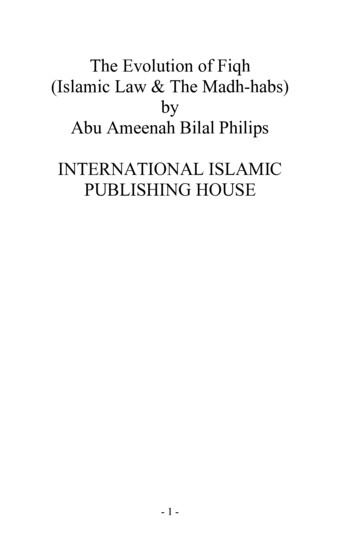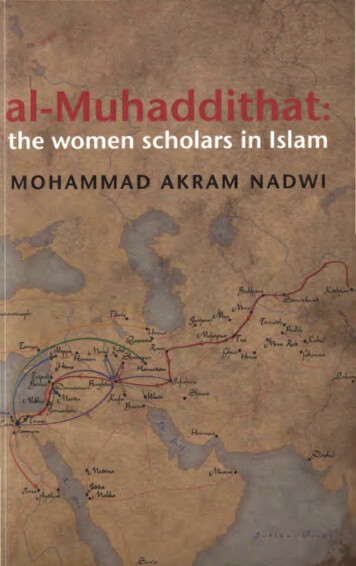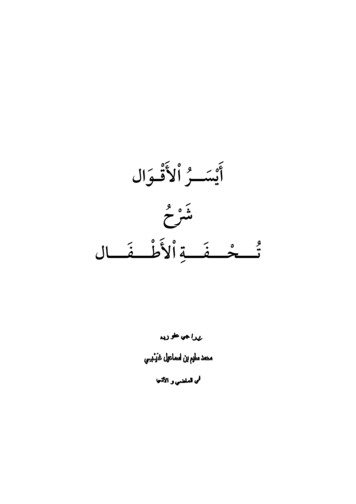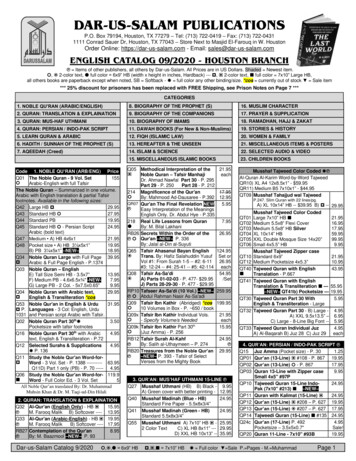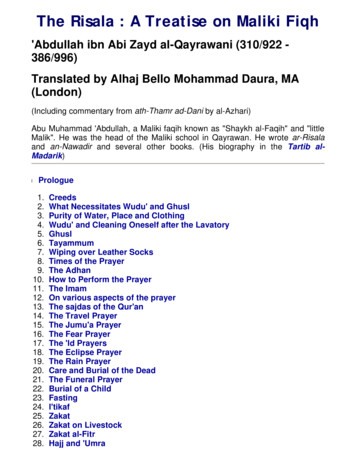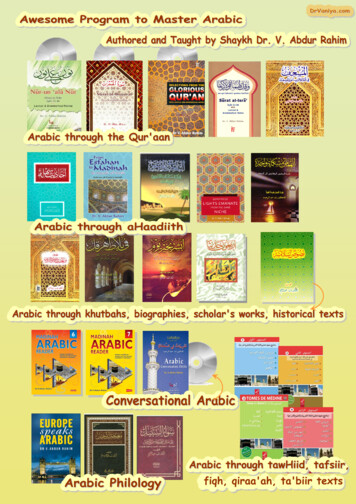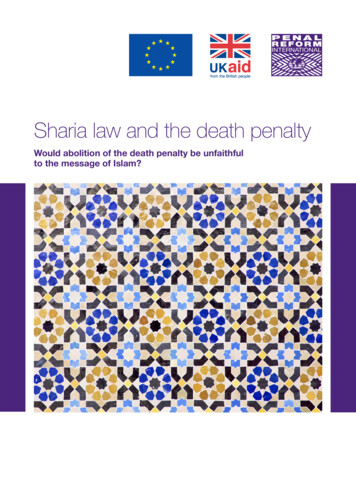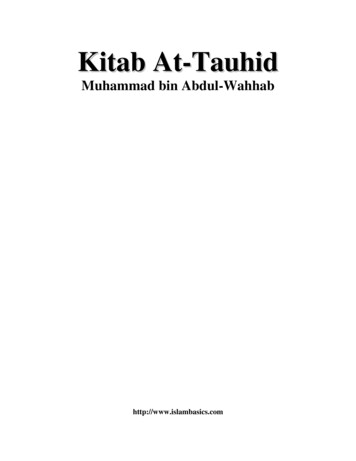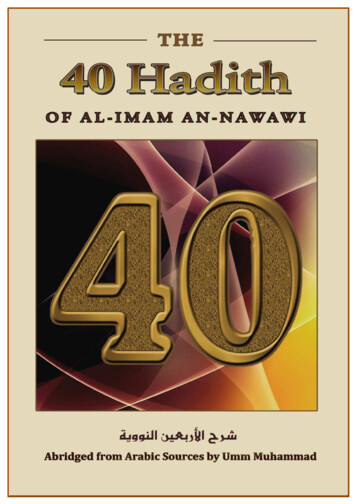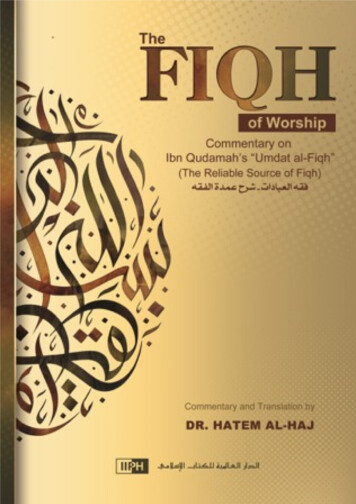
Transcription
Fiqh of Worship (1)The International University in Latin America ﺷﺮﺡ ﻋﻤﺪﺓ ﺍﻟﻔﻘﻪ Commentary on‘Umdat al-Fiqh(The Reliable Source of Fiqh)By ﻣﻮﻓﻖ ﺍﻟﺪﻳﻦ ﻋﺒﺪ ﺍﷲ ﺑﻦ ﺃﺣﻤﺪ ﺑﻦ ﻣﺤﻤﺪ ﺑﻦ ﻗﺪﺍﻣﺔ ﺍﻟﻤﻘﺪﺳﻲ Muwaffaq-ud-Deen, Abdullah ibnAhmad ibn Muhammad ibnQudamah al-MaqdisiCommentary and translationByHatem al-Haj-1-
Fiqh of Worship (1)-2-
Fiqh of Worship (1)WelcomeKnowledge SeekersThis was a statement said by the Messenger of Allah (1), may Allah'speace and blessings be upon him, fourteen centuries ago, but, has beeninscribed in his heirs hearts, ever since! With this blessed statement, theProphet's heirs (i.e. scholars) receive, welcome, make room for andappreciate dedicated educational efforts of knowledge seekers fromanywhere in the world.Sharī ah sciences, dear students, are the prophetic heritage. Prophets didnot bequeath dirhams or dinārs; but, they did bequeath knowledge.Whosever portion learned by people is their share in prophetic heritage. Inthis sense, seeking knowledge is the highest quest that lives and means arespent on. The longest moment of regret is that in which man does not seek apiece of knowledge or do a good deed.Taking its first steps to disseminate knowledge on the vast Earth for thesake of Allah and following His Prophet's Sunnah (traditions), theInternational University in Latin America (IULA) is making Latin Americaits launching platform. In this way, IULA is breaking new forgotten landswhere many Muslims and Muslim institutions never cared to set foot. IULAis, thus, following in the footsteps of the Prophet's Companions who leftMadīnah to communicate the Prophetic Message and traditions to peopleeverywhere on earth, preferring to do so than to staying in Madīnah next tothe Prophet's holy mosque where Salāhs (prayers) are worth more onethousand times than in any other mosque.(1) This is a part of a Hadīth compiled by Imām At-Tabarāni in his “Al-Mu jam AlKābir” (8/54) and narrated by Safwān Ibn Assāl Al-Murādi. In Majma AzZawā d, Al-Haythamiyy said that the narrators of this Hadīth conform to thecharacteristics of the narrators of Sahīh [Al-Bukhāriyy] (1/131).-3-
Fiqh of Worship (1)And, a piece of advice to knowledge seekers (students) at the veryoutset of this endeavor you should intend to only please Allah, Almighty,and never spoil your noble quest with selfish desires. He who learns a divinescience for worldly gains will never smell the fragrance of Paradise in theHereafter! A competent proof is the Hadīth that says: “Verily (the value of)deeds depend on the intentions behind them.”(1).The primary method of learning Islamic sciences is face-to-facepresentation or direct teaching. Over centuries, scholars have learned viathis method which should not be avoided as best as possible. It is said thathe who makes books his (or her) sheikhs (i.e. teachers) makes moremistakes! Be sure to attend lectures presented by your IULA s visitorprofessors and/or technical media that communicate knowledge with voiceand/or voice and video and link you to your teachers any and everywhere.Make every effort to learn and pay sincere attention to activities and tests atthe end of each learning module. Your IULA wishes you every success.Only Allah's reward is sought, and it is only He Who guides to the rightpath.Prof. Dr. Salāh As-SāwiIULA Rector(1) This Hadīth is narrated by both Imāms Al-Bukhāriyy and Muslim from Umar IbnAl-Khattāb, May Allah be pleased with him. Imām Al-Bukhāriyy mentions it inhis book under the section titled “Revelation”, Hadīth 1, and Imām Muslimdoes in the section titled “The Prophet's Statement: Deeds Depend onIntention”, Hadīth 1907.-4-
Fiqh of Worship (1)ContentsGENERAL OBJECTIVES .KEY TO ABBREVIATIONS .NOTES AND ACKNOWLEDGMENTS.Notes . .Acknowledgements . .THE INTRODUCTION TO AL-‘UMDAH BY IBN QUDAMAH.THE BOOK OF ZAKAT .Zakat is obligatory upon.Zakat is only obligatory on four types [of property] .The Chapter of Zakat on Free-grazing Livestock (Sa’imah).The first kind is: camels .The second kind is: cows .The third kind is: sheep .[What he may give of his flock:] .[Joint Ownership] .The Chapter of Zakat of That Which Comes Out of the Earth.[Types of What Comes out of the Earth].The first of the two is plants .[The Second Type: Metals] .The Zakat on rikaaz.The Chapter of Zakat of Currency .[Zakat of permissible jewelry] .Chapter of the Ruling on Zakat of Debt.[Rulings of Zakat on Debts That Pertain to Creditors].[Rulings of Zakat on Debts That Pertain to Debtors].-5-
Fiqh of Worship (1)Chapter of Zakat of Merchandise .[Currency and merchandise are one type].Chapter of Zakat Al-Fitr .Chapter of How to Pay Zakat.Chapter of Who May Receive Zakat? .Chapter of Those Who May Not Be Given Zakat .THE BOOK OF FASTING .Fasting in Ramadan .[The Beginning of Ramadan] .Chapter of The Rulings of Those Exempt from Fasting. .Chapter of the Things That Invalidate Fasting.[Ruling of Forgetfulness and Compulsion] .[These Acts Do Not Break the Fast].[Mistakes].Chapter of Voluntary Fasting .Chapter of Devotional Retreat .THE BOOK OF HAJJ AND ‘UMRAH .[Conditions of Obligation] .[The condition of a Mahram for women].[Conditions of Validity].Chapter of the Sites of Ihram .The Chapter of Ihram .[Forms of Hajj and Umrah] .[Talbeyah].Chapter of the Unlawful Things during Ihram.Chapter of Expiation .-6-
Fiqh of Worship (1)[Doing an Ihram prohibition absent-mindedly].[Where should one expiate].Chapter of Entering Makkah .[First Tawaaf].[Sa’ey].[Exiting from the Ihram of Umrah].Chapter of the Description of Hajj .th[Func4ons of the 5 (Tarweyah)].th[Func4ons of the 8 (‘Arafah)] .th[Func4ons of the :; (Eid)].[Ramy/Stoning] .[Nahr/Slaughtering].[Tawaf al-Ifadah] .[Total Exiting from Ihraam] .Chapter of What He Should Do After Removing Ihram .[Mabeet/Sleeping over in Mina] .[Rest of the Ramy/Stoning] .[Wadaa’/Farewell to the House] .The Chapter of the Pillars of Hajj and ‘Umrah .The pillars of Hajj are:.The obligatory acts are:.The pillars of ‘Umrah are:.And its mandatory actions are: .[Missing part of Hajj and Umrah] .Chapter of al-Hady and al-Udhiyah.[Conditions of a valid udhiyah].[How to slaughter].[Who slaughters] .[When to slaughter] .[How to divide the sacrifice] .Chapter of ‘Aqeeqah .-7-
Fiqh of Worship (1)The Introduction to al-‘Umdah by IbnQudamahIntroduction In the name of Allah, most Beneficent, most Merciful. , ! " # % #& & # ' , () * ,- . / 0 12 3 4 ' , 5 67 8 1 9 : 3 ; ( 6(1 ; , 8 ;A 8-5 @5 2 , 8 05 ?All types of thanks and praise are due to Allah, the most worthy ofthanks and praise, a praise superior to all other types of praise, like thesuperiority of Allah over all of His creation. I bear witness that nothingdeserves to be worshipped / adored except for Allah, He is one withoutpartners, the witness of someone who recognizes and establishes His right.I bear witness that Muhammad is His slave and messenger, without beingdoubtful about his truthfulness. May Allah bestow blessings on him, hisfamily, and his companions – as long as the clouds bring about rain and thethunder comes after the lightning. % B08 C DE 8 ,' F G H % ,E ) * I C , @5 AD - 0:0 JK ) 5 ( 0L M3 ( KC ,N72 '0F To proceed: This is a book on Jurisprudence. I summarized it as muchas possible. I limited myself in it to one opinion, in order that it becomes areliable source of information, and so that the right opinion is not confused-8-
Fiqh of Worship (1)because of differences in the opinions narrated by the scholars after ImamAhmad and those narrated from him directly.,U3 V W % ,U (@ X - L O(, P 0)& Q@5 RS T1,6 - F :0 L YK )& * Z @, [ 31 @ ! \ Z& 3:TCA 0 6@[ S3 % 0 ,6 W@ [ 0]2 Z& B0;0N[0@X Some of my brothers had asked me to summarize it to make it moreaccessible to those seeking knowledge, and to make it easy to memorize forthe seekers/students of knowledge. Therefore, I answered this request,relying on Allah to make my intention sincere and for His Face, and help meupon reaching His great pleasure. He is sufficient for us and the bestdisposer of affairs. RS 1 L a (@: , ( b , c d,N ; e % A & 3 [ aI included in it authentic narrations for their blessings, and authority. Ichose them from the authentic collections in order to not need to referencethem.-9-
Fiqh of Worship (1)General Goals for studying the curriculumThe general goals of this course are concentrated in thefollowing points:-10-
Fiqh of Worship (1)Table of ContentsThe book is divided into the following lectures:Unit 1Unit 2Unit 3Unit 4Unit 5Unit 6Unit 7Unit 8Unit 9Unit 10Unit 11Unit 12-11-
Fiqh of Worship (1)-12-
Fiqh of Worship (1)Key to AbbreviationsAg: agreed upon (reported by both al-Bukhari and Muslim)B: al-BukhariM: MuslimA: AhmadD: Abu DawoodT: at-TirmidhiN: an-Nasa'eeMa: Ibn MajahG: the group, reported by all the aboveThe Five: reported by (A D T N Ma)The Four: reported by (D T N Ma)The Three: reported by (D T N)H: al-HakimKh: Ibn KhuzaimahHib: Ibn HibbaanBa: al-BaihaqiTab.K : at-Tabaraani in al-KabeerTab.A : at-Tabaraani in al-AwsatTab.S : at-Tabaraani in al-SagheerI: Irwa' al-Ghaleel by al-AlbaniAuth : AuthenticS: SoundW: WeakH:Hanafi; h: the less popular opinion in the madhhab. ( H) Hanafiposition is similar. (-H) Hanafi position is different.M:Maliki; m: the less popular opinion in the madhhab. ( M) Hanafiposition is similar. (-M) Hanafi position is different.S:Shafe'ee; s: the less popular opinion in the madhhab. ( S) Hanafiposition is similar. (-S) Hanafi position is different.A:Hanbali (Ahmad ibn Hanbal); a: the less popular opinion in themadhhab.H2, M2, S2, A2: another opinion in the madhhab.T:Ibn Taymeyah's choices.-13-
Fiqh of Worship (1)Z :Zahiris:Consensus on the last statement or phrase, directly preceding thesymbol. (not the whole paragraph). Sometimes, for clarity, I added (--) between the statement upon which there is consensus and thepreceding one. Used for consensus Used for contemporary issues Used for the citation of scholarly opinionsUsed for the author’s choices Used for the textual evidenceUsed for non-textual evidence (reasoning)-14-
Fiqh of Worship (1)Notes and AcknowledgmentsBy the CommentatorNotes The word “fiqh” literally means “understanding”, which would thenmean in the context of the religion the good understanding of the entirereligion. In the terminology, it is used to refer to the Islamic law. TheIslamic law addresses the Divine injunctions pertaining to worship,personal conduct and interpersonal dealings. The jurists study theserulings and the evidence used to derive them. The science of fiqh is thusdefined as the recognition of the religious rulings derived from thedetailed proofs. The proofs are absolute and relative. The absolute ones are the Book ofAllah, the Sunnah of His Messenger and the consensus of the ummah.The relative ones include al-qiyas (analogy), which could, when clear,come closer to the absolute proofs, and then there are many othersources of proofs with some controversy regarding their strength,applications and scope. These issues are discussed in detail in the booksof “Usool al-Fiqh” (Principles of Fiqh). All actions (not objects) have rulings in Islam, and they belong to one ofthe following five categories:1. Mandatory (wajib)2. Preferable (mustahab)3. Permissible (mubaah)4. Disliked (makrooh)5. Forbidden (haraam)It is the work of the faqeeh (jurist) to deduce from the proofs a rulingfor every action. That requires an immense amount of knowledge of theQuran, Sunnah, scholarly opinions, language and many other disciplines. There are five major and comprehensive legal principles that serve asthe thread connecting the pearls of fiqh and they apply in all of thechapters of fiqh, and these are:1. Deeds are but by their intentions-15-
Fiqh of Worship (1)2.3.4.5.Certainty is not negated by doubtHardship mandates the making of concessionsNo harm and no reciprocation of harmCustoms are given considerationYou will find these principles frequently used throughout the book. Fiqh is either studied according to one madhhab (fiqh madhhabi) oraccording to the various schools of fiqh recognized by the ummah aswell as the opinions of independent scholars, and that is called “fiqhmuqaran” (comparative fiqh). There are benefits in every method, butmost of the scholars recommend for the beginner on the path of theserious seeking of knowledge to start with one madhhab. In this work,we will follow their advice by choosing a classical matn of fiqhmadhhabi, which is here Hanbali. We will add a flavor of comparativefiqh in the footnotes to attain some of the benefits of this method asdiscussed here below. The fiqh is usually divided into two large categories: Fiqh of Worship(Fiqh al-‘Ebadaat) and Fiqh of Interpersonal Dealings and PersonalConduct (Fiqh al-Mu’amalaat wa al-Adaab ash-Shar’eyah). Fiqh al‘Ebadaat includes the chapters of Purification, Prayers, Funerals, Zakaat,Fasting and Pilgrimage. In this first part, we will have Purification,Prayers and Funerals. The book of al-‘Umdah is an abbreviated book of Fiqh according to theHanbali school of Fiqh (madhhab). The abbreviated books used to becalled “matn” (text). Then, commentaries (shurooh, pl. of sharh) andfootnotes and side notes would be added (hawashi, pl. of hasheyah). Themutoon (pl. of matn) were meant to be decisive and easy to memorize bythe students of knowledge. They served as a code. Al-‘Umdah is highly regarded within the Hanbali madhhab and it iswritten by one of the greatest scholars within the madhhab as well as inthe history of Islam, which is Imam Ibn Qudamah al-Maqdisi (mayAllah bestow mercy on him) who died in the year 620 A.H. The reason why I chose to write a brief commentary on the book vs.translating one of the older and certainly more credible commentaries-16-
Fiqh of Worship (1)(shurooh) written by our greater scholars of the past is to place moreemphasis on the issues that face the contemporary Muslims morefrequently. In addition, Muslims who live in English speaking countriesmay have different needs that I meant to address. I also added someviews from outside of the madhhab when indicated. This is particularlyimportant knowing that many of the contemporary students may onlystudy one book. Quoting opinions that are contrary to those of the author's should not beperceived as a form of disrespect for the author, who was one of thegreatest in the history of Islam, to the point that Imam Ibn Taymiyahsaid that no one has entered ash-Sham after al-Awza'ey that is moreknowledgeable than al-Muwaffaq (Ibn Qudamah). The scholars of thepast and present differed and will continue to differ in the future in-sha'Allah. The opinions that I present here are for notable scholars as well,and the truth is not confined within one madhhab or one scholar'spositions. That does not mean that what I consider strong is in factstronger, for I am in no position to say that. I have, therefore, chosen toavoid the use of words such as stronger or weaker, and when I believe inthe strength of a particular position, I simply call it strong. It is thereader's responsibility to seek what s/he feels is more consistent with theproof. Some of the other benefits of mentioning opinions from within andwithout the madhhab of the author include getting us used to thedisagreements between the jurists and learning why they differed. Thiswill make us have more respect for all of them, and appreciation fortheir ijtihaad (expert reasoning). In addition, it would help us recognizeother strong and popular opinions that are different from the author’s.This may have various benefits and may spare us from uneducated andoften futile debates. It would be a valid question to say, if you will not abide by the opinionsof al-'Umdah, why call the book an exegesis of the 'Umdah, and why notgather opinions from different books and give the new book a differentname? The reply to this is that the student of knowledge should attemptto memorize (or come close) the text of one single classical book like al'Umdah written by one of Islam's greatest scholars of all times, like Ibn-17-
Fiqh of Worship (1)Qudamah. Then, the student of knowledge may broaden his horizons bylearning about the various opinions of the other equally great scholars ofIslam. This method would protect him from confusion, and unless thetruth is clearly obvious to him to be with another scholar, he shouldabide by the opinion of the madhhab he chose to study. I hope thathaving the text of al-'Umdah in bigger font, on the top of the page, andseparate from the commentary will help the student make a visualdistinction in his memory between the text and the commentary. It is also noteworthy to mention here that I tried to avoid addinganything to the text (matn) except when I felt necessary or helpful to addsome titles or explanations. You will find those additions clearlydemarcated by being inside the cornered brackets [ ]. H, M, S, A are used to refer to the different madhhabs in the footnotes.They do not mean that it is the only opinion within the madhhab, nor dothey always mean it is the opinion of the founder. For sometimesanother opinion contrary to the founder's becomes the more popular.That is because our great jurists, particularly the earlier ones wereseekers of the truth, not zealots. The use of "should" before a recommendation does not necessarily meanit is obligatory, for it may be preferable or mandatory, likewise, the useof "should not" does not mean it is forbidden, for it may be disliked orforbidden. When "must" and "must not" are used, it means an obligationor prohibition respectively. Black boxes in the footnotes surround matters of consensus and unshaded boxes will surround matters of contemporary implementations.-18-
Fiqh of Worship (1)Acknowledgements I used the website resources for looking up textual evidence, verifyingauthenticity of reports and obtaining translations of different verses ofthe Quran and ahadeeth, as well as some quotations of the earlier andlatter scholars. Of the sites I benefited mwww.dorar.netwww.al-islam.comwww.islamtoday.net I also benefited from Jamal Zarabozo's translation of Fiqh-us-Sunnah,the blessed book by the late scholar Sayed Sabiq (may Allah bestowmercy on him) which is made available at www.usc.edu. I made somemodifications to the translation when I felt necessary. I also benefitedfrom the translation of "'Umdat as-Salik" named "Reliance of theTraveler" by Nuh Ha Mim Keller. Finally, I would like to thank all of the staff members of the ShariaAcademy of America (SAA), who were instrumental in encouraging meto finish the second part of this work for the benefit of their students. May Allah greatly reward all of those who diligently, relentlessly andtirelessly work for the cause of this beautiful religion and may Hepardon them, forgive their shortcomings and faults and may He bepleased with them.-19-
Fiqh of Worship (1) ﻛﺘﺎﺏ ﺍﻟﺰﻛﺎﺓ The Book of Zakat(1) 5 L[, , !( -% 6( F( N3: R Zakat is obligatory upon every free Muslim(2) who has completeownership(3) of the nisaab (Zakat threshold(4)). a LS 9b[ ,f2 a g2 h * #& B0 ( B0i j % B * k # ,b (; B0% bl0% 'mC n5- g S[When is the passing of a (hawl) not a condition of obligation?](1) Meaning and Wisdom of ZakatThere is no one comprehensive word alone that adequately translates Zakat. The wordsalms, donations, charity and so on do not convey the meanings embodied in the wordZakat, which include: Purification, for it purifies one's money from suspicious earnings and it purifies one'sheart from stinginess and miserliness Increase, for it increases the wealth of the recipient as well as that of the donor by theblessings that will be put in his money, himself and his family and also, through thesupplications of the recipient Praise, for it will be a cause for the donor being praised on the Day of Judgment,also, s/he
applications and scope.These issues are discussed in detail in the books of"Usool al-Fiqh"(PrinciplesofFiqh). All actions (not objects) have rulings in Islam,and they belong to one of thefollowingfivecategories: 1. Mandatory(wajib) 2. Preferable(mustahab) 3. Permissible(mubaah) 4. Disliked(makrooh) 5. Forbidden(haraam)
